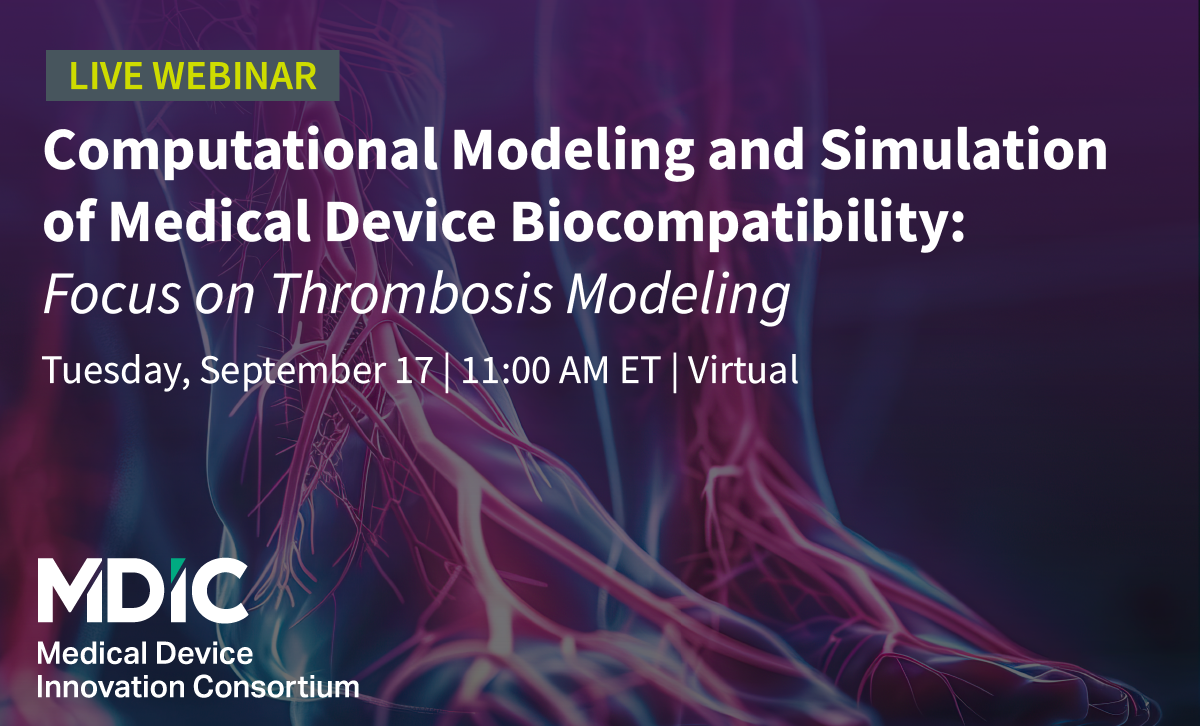Computational Modeling and Simulation of Medical Device Biocompatibility: Focus on Thrombosis Modeling
Tuesday, September 17, 2024
11:00 a.m. – 12:00 p.m. ET
Virtual Event
Free to Attend
Join us for a live webinar hosted by the Medical Device Innovation Consortium (MDIC), on September 17th at 11:00 AM US EST focusing on Computational Modeling and Simulation (CM&S), Blood Damage Models, Thrombosis Modeling.
Assessing thrombosis potential is essential to establishing the biocompatibility of blood-contacting medical devices. Computational fluid dynamics (CFD) has proven to be a useful complementary tool for understanding mechanical sources of blood damage such as shear stress, exposure time, and flow recirculation. In an effort to understand the applicability of thrombus modeling for device development and regulatory review, an industry round-robin study was carried out by the MDIC Blood Damage Working Group. This webinar will review the results of this round-robin study and discuss future directions for this work.
Click here for more information on the MDIC Computational Modeling and Simulation program.
Registration is free, and all interested parties are welcome to attend. We look forward to seeing you there! For any additional assistance, please contact the MDIC program contacts listed below.
Program Contacts:
- Jithesh Veetil, Senior Program Director at jveetil@mdic.org
- Taylor Montgomery, Project Manager at tmontgomery@mdic.org
Speakers:

Jithesh Veetil
Senior Program Director, Digital Health and Technology
MDIC
Dr. Jithesh Veetil, PhD serves as the Senior Program Director of Digital Health and Technology portfolio at the Medical Device Innovation Consortium (MDIC). His prime focus at MDIC is to aid in the development of regulatory science resources and regulatory grade tools working collaboratively with government and industry stakeholders in an effort to advance solutions that promote patient access to innovative medical technologies. Jithesh’s current portfolio at MDIC includes projects in Medical Device Cybersecurity, Medical Extended Reality (MXR), Software as/in Medical Devices (SaMD/SiMD), Computational Modeling & Simulation (CM&S), and Digital Pathology.
 Marc Horner
Marc Horner
Distinguished Engineer
Ansys

Kurt Svihla
Lead Engineer
Ansys
Kurt is a lead engineer at Ansys, supporting the Ansys fluids products Fluent and CFX. He received his PhD in chemical engineering from Florida State University. He has worked at Ansys for 24 years in a variety of roles including support, consulting, training, and application engineering. He has supported a number of clients in the pharmaceutical and medical device industry.
Koohyar Vahidkhah, PhD 
Distinguished Engineer at Advance Technology – Advanced Engineering Services
Edwards Lifesciences
Koohyar is a distinguished engineer in Advanced Engineering Services team at Edwards Lifesciences Advanced Technology business unit. He has been with Edwards for 3 year as an expert in computational fluid dynamics (CFD) and fluid structure interaction (FSI) as well as multi-scale modeling and simulation. Prior to Edwards, he worked as an application engineer at Siemens Digitial Industries. He has a PhD in Mechanical and Aerospace Engineering from Rutgers University and did a post-doc in Cardiac Biomechanics Lab at the University of Denver. His has +15 years of experience in modeling and simulation of biofluid mechanics and fluid-solid interaction in biological systems.
 Brent Craven, PhD
Brent Craven, PhD
Senior Science Advisor of Computer Modeling & Simulation,
Office of Science and Engineering Laboratories, CDRH, U.S. Food and Drug Administration
Brent Craven is the Senior Science Advisor of Computer Modeling & Simulation in the FDA’s Center for Devices and Radiological Health’s (CDRH) Office of Science and Engineering Laboratories (OSEL). He received his PhD in Mechanical Engineering from the Pennsylvania State University in 2008. His areas of technical expertise include computational fluid dynamics, fluid-structure interaction, multiphysics modeling, patient-specific modeling, in silico clinical trials, and verification, validation, and uncertainty quantification (VVUQ) methods applied to medical devices. His research and policy efforts at the FDA primarily focus on advancing computer modeling and VVUQ methods for medical devices. In addition, he regularly serves as a subject matter expert on medical device regulatory submissions. He has authored over 60 refereed journal articles and more than 100 conference proceedings and abstracts. He is currently an Associate Editor for the Journal of Verification, Validation and Uncertainty Quantification and Frontiers in Physiology. He has received a number of awards for his research and regulatory contributions, including the 2022 FDA Scientific Achievement Award for Excellence in Data and Computational Science, the 2018 FDA CDRH Excellence in Scientific Research Award, and an FDA Commissioner’s Special Citation Award in 2021 for his regulatory contributions in the review of emergency use ventilators.



